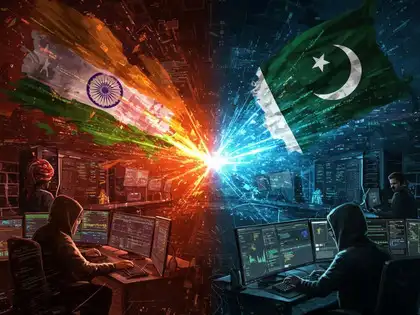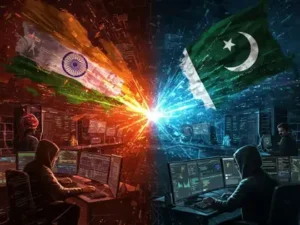
A Closer Look at the Most Recent Defence Website Hack Targeted by Pakistani Cyber Groups
Emerging Cyberthreats

Cybersecurity is now a frontline battle in a time when digital warfare is just as important as traditional military conflicts. State-sponsored hacking operations continue to pose a growing threat as evidenced by the most recent attack on India’s defence infrastructure by cyber groups based in Pakistan. Concerns regarding the readiness of Indian cyber defences against ongoing cyber espionage attempts are raised by these breaches which reveal weaknesses in national security.
What Happened During the Attack?

Pakistani hacker groups reportedly planned cyberattacks against several Indian defence websites such as the Manohar Parrikar Institute of Defence Studies and Analysis and the Military Engineer Services. The attackers allegedly gained access to these platforms and compromised government communications and vital data claiming to be connected to the notorious “Pakistan Cyber Force.”
The attempt to vandalise the official website of Armoured Vehicle Nigam Limited a defence PSU was among the most concerning elements of this attack.
In an attempt to provoke and establish dominance in the field of cyberwarfare hackers replaced the homepage with an image of the Al Khalid tank and the Pakistani flag. Indian Authorities responded by taking the website offline in order to carry out a comprehensive security audit and stop any additional breaches.
“Rabies Death After Vaccination
The Consequences of Cyberwarfare

These kinds of cyberattacks are acts of digital aggression that jeopardise a country’s security and operational integrity going beyond simple disruptive incursions. Defence organisations rely significantly on data-driven intelligence in an increasingly interconnected world and unapproved breaches can have serious repercussions. Cyberwarfare has the power to change geopolitical dynamics and undermine confidence in technological infrastructures by exposing delicate defence tactics and tampering with vital information systems.
This attack comes after a series of cyberattacks against Indian institutions in recent years by Pakistani hacker groups. Similar incidents have targeted military platforms, government organisations, and banking networks, all of which present serious national security threats.
India’s readiness for cybersecurity

Although India has made great progress in strengthening its cyber defences frequent attacks draw attention to still-existing weaknesses that require immediate attention. Through programmes like the National Cyber Security Policy and the creation of specialised cyber response teams within the Defence Cyber Agency the Indian government has been strengthening its cybersecurity framework.
However hackers are using increasingly complex tactics like distributed denial-of-service (DDoS) attacks malware injections and phishing and cyber threats are always changing. The most recent attack serves as a reminder of the necessity of ongoing improvements to cybersecurity infrastructure more robust encryption and improved interagency sharing of threat intelligence.
Moving Forward

India must strengthen its digital defences against these cyberthreats by implementing strong cybersecurity regulations implementing cutting-edge AI-powered threat detection systems and working with international cybersecurity specialists. Risk mitigation will also be greatly aided by increased funding for cybersecurity research and defence personnel training initiatives.
Furthermore combating cyberwarfare still heavily relies on international cooperation. Nations can effectively combat cyber threats by utilising diplomatic strategies intelligence sharing and cybersecurity alliances. To strengthen its cybersecurity resilience and stop hostile cyber entities from gaining the upper hand India needs to collaborate closely with its allies.
In conclusion
A clear reminder that digital battlefields are just as important as physical ones is provided by the recent cyberattacks on Indian defence websites. Countries must continue to be alert proactive and ready for new threats as cyberwarfare intensifies. To protect India’s digital landscape from future breaches it will be crucial to strengthen cybersecurity frameworks and implement state-of-the-art defensive measures.





